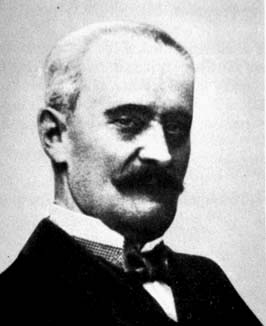


 تاريخ الرياضيات
تاريخ الرياضيات
 الرياضيات في الحضارات المختلفة
الرياضيات في الحضارات المختلفة 
 الرياضيات المتقطعة
الرياضيات المتقطعة
 الجبر
الجبر
 الهندسة
الهندسة 
 المعادلات التفاضلية و التكاملية
المعادلات التفاضلية و التكاملية 
 التحليل
التحليل
 علماء الرياضيات
علماء الرياضيات |
Read More
Date: 26-1-2017
Date: 22-1-2017
Date: 2-2-2017
|
Born: 28 March 1847 in Sárosd, Fejér County, Hungary
Died: 27 December 1930 in Pestszentlorinc, Hungary

Gyula Farkas's father was the steward on the Sárosd estate, situated in Fejér megye (county) in central Hungary. He was sent to Györ, in northwest Hungary, for his secondary education from the Benedictines. Just southeast of Györ is Pannonhalma Apátság, a Benedictine abbey founded in 969 by Prince Géza. After completing his schooling by the Benedictines, Farkas went to Pest with the intention of studying law and music. However, neither of these two subjects proved suitable for him to follow as a career since he came to dislike law, and he did not have the talent necessary to become a professional musician.
We should look at the political events which formed the background to Farkas' upbringing. In 1849, when he was two years old, the Hungarians had defeated the Habsburgs and declared Hungarian independence on 14 April. Following this a combined force from Russia and Austria retook the country and the Hungarian army surrendered on 13 August. A period followed where many Hungarians were shot or imprisoned. However, the Habsburg Empire was weakened by external conflicts over the following decades and in the Compromise of 1867 the Hungarian Kingdom and the Austrian Empire became independent states within the Austro-Hungarian Monarchy. Some Hungarians were happy with the arrangement, others were not and would be satisfied with nothing short of full independence. However, the Compromise led to raising standards of education in mathematics and the sciences and Farkas would play his part in bringing the country up to international levels.
Farkas worked as a private tutor for a while before returning to university to study physics and chemistry. He then returned to his native county of Fejér, teaching at the Modern School in the county town of Székesfehérvár. In 1874 he went to work for Géza Batthyany, the Count of Polgárdi, teaching his children mathematics and physics. Farkas now had time to undertake research both in mathematics and physics, and to help him in this he had the use of a specially designed physics laboratory which the Count of Polgárdi had built to help with his children's education. Farkas was also given the opportunity to make visits abroad to broaden his background in mathematics and physics.
By 1880 Farkas had an impressive publication record in Comptes Rendus and was appointed as a dozent in function theory at the university in Pest. His career continued to flourish and in January 1887 he was appointed as an extraordinary professor at the University of Kolozsvár (which had been founded in 1872), and in the following year he became an ordinary professor there. Filep writes in [4]:-
Fifty years ago, on December 26, 1930, the outstanding Hungarian mathematician and physicist Gyula Farkas died. He was a member of the Hungarian Academy of Sciences and an honorary member of the Loránd Eötvös Mathematics and Physics Institute. After his death both he and his accomplishments for the most part fell into obscurity. However, at present renewed attention is being given to his results in optimisation theory and mechanics.
Readers may have noted that we have given 27 December as the day of Farkas's death, rather than 26 December given by Filep in the quotation above. There appears to be some uncertainty as to which is correct.
In fact he is remembered for Farkas theorem which is used in linear programming and also for his work on linear inequalities. In 1881 Gyula Farkas published a paper on Farkas Bolyai's iterative solution to the trinomial equation, making a careful study of the convergence of the algorithm. In a paper published three years later, Farkas examined the convergence of more general iterative methods. He also made major contributions to applied mathematics and physics, particularly in the areas of mechanical equilibrium, thermodynamics, and electrodynamics. Szénássy writes [1]:-
One of the greatest personages of Hungarian theoretical physics and an inventive user of mathematical tools was Gyula Farkas. His essays on the conditions of stable thermodynamic equilibrium and his article of 1895 in which he obtained the so-called Carathéodory principle of thermodynamics 14years ahead of Carathéodory himself stirred an international sensation. He began a new study of the nearly forgotten Fourier principle; the articles he devoted to this subject containing several original mathematical results as well [published in 1896 and 1902].
Not only did Farkas serve the University of Kolozsvár as a professor, but he also served as Dean and as Rector of the University. In 1915 he resigned his position at the University since his eyesight was deteriorating to such an extent that he felt unable to carry out his duties properly. He retired to Budapest where he lived in retirement for 15 years. After Farkas's first wife had died, he remarried but his second wife died before he retired and he lived alone in his retirement until he moved in with one of his relations a few months before his death.
Books:
Articles:



|
|
|
|
علامات بسيطة في جسدك قد تنذر بمرض "قاتل"
|
|
|
|
|
|
|
أول صور ثلاثية الأبعاد للغدة الزعترية البشرية
|
|
|
|
|
|
|
في مستشفى الكفيل.. نجاح عملية رفع الانزلاقات الغضروفية لمريض أربعيني
|
|
|